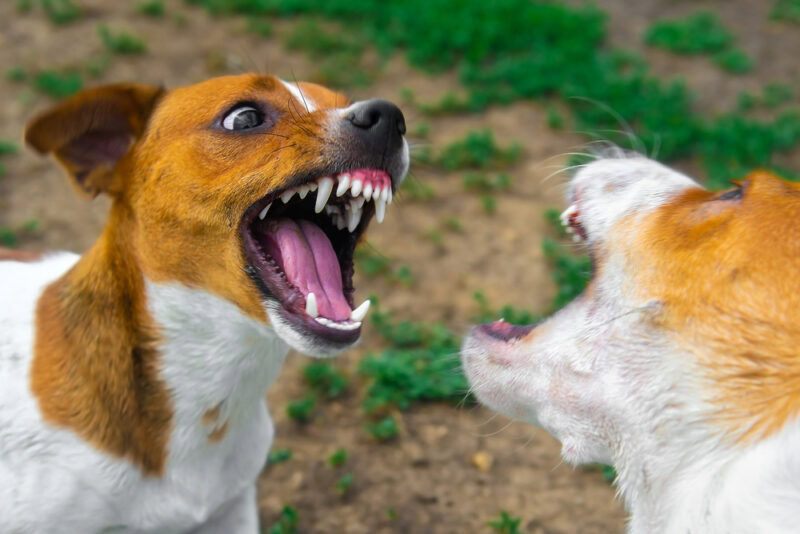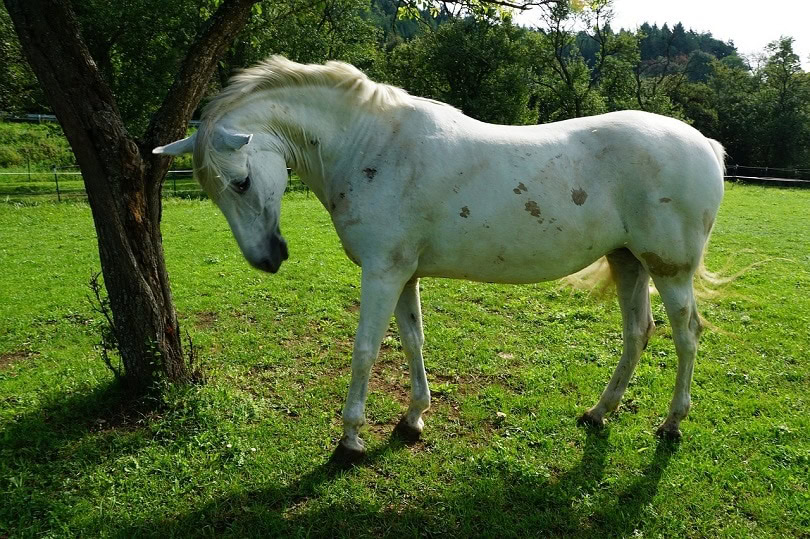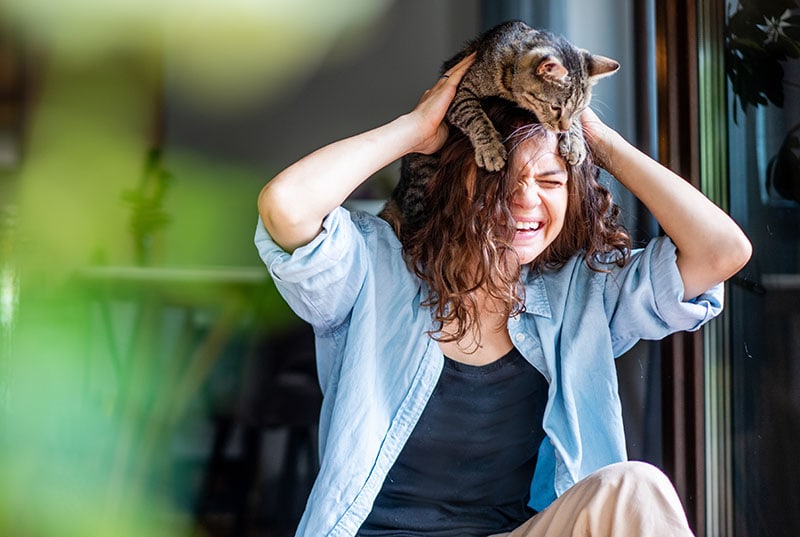VET APPROVED

The information is current and up-to-date in accordance with the latest veterinarian research.
Learn more »Click to Skip Ahead
All dog owners have witnessed sad puppy dog eyes or felt a shift in mood after denying their dog their leftover chicken or a walk to the park. While we can see their emotions being expressed at the moment, some owners believe that those feelings hang around and that their dog may hold onto them. We know that dogs have an excellent memory and can understand their owner’s tone of voice and facial expressions and will respond to them, which may beg the question: do dogs hold grudges?
While it may be instinctual to attribute human emotions to our dogs, resentment is a complex emotion, and while dogs can feel emotions, they can’t recall the specific incident that made them feel sad or angry. However, that does not imply that dogs do not retain unpleasant memories, but reframing the conversation in terms of associations is helpful. Negative associations may cause behaviors you would mistake as your dog holding a grudge.

What it Means to Hold a Grudge
To understand whether or not our dogs can hold grudges, we need to define what holding a grudge means. When you find it difficult to let go of feelings of resentment or anger towards someone who has hurt you, you may be holding a grudge, and it can be challenging to forgive someone who hurt you.
Dogs clearly experience several human-like emotions, but they don’t necessarily manifest in the same ways as in people. Dogs are thought to be incapable of resentment because it is a very complex and human emotion. Dogs cannot understand this human feeling because they cannot distinguish between what is fair and what isn’t and cannot actively choose to hold a grudge based on a specific event.

Do Dogs Hold Grudges?
To investigate if dogs can hold grudges, it is important to make a distinction between the human act of holding a grudge and how animals make associations. Humans can hold a grudge for years and remember every detail from the event, while dogs, because of their episodic memory, are prone to forgetting some events almost immediately after they occur.
However, they possess a powerful association memory, which could drive them to respond in a particular way and could lead you to assume that your dog is harboring resentment or holding a grudge. Due to their associative memory, dogs respond to people, places, and events by the associations they have with those things. These associations can both be negative or positive.
Dogs may remember how they felt and link a human or another animal to a particular scent or reaction, but it’s unlikely that they will recall the specific negative experience. For example, your dog may become unhappy if you insist on bathing them. While your dog is not mad at you, it might start to associate this specific event with something that made them unhappy. So, if your dog tries to hide when it is bath time again, it does not mean that your dog is holding a grudge, but rather remembering the unpleasant situation and may be trying to avoid it.
To conclude, dogs can feel emotions but they are not as complex as ours. They may associate a certain feeling with a smell or specific event, which can make them feel uneasy. However, your dog won’t actively hold a grudge or hold resentment against you because they simply don’t harbor long term negative emotions.
Can Dogs Hold Grudges Against Other Dogs?
As we mentioned before, dogs don’t have the capacity to understand what a grudge is, so again, it is unlikely that a dog can hold a grudge against another dog. We know that dogs have an excellent sense of smell and a good memory, so they may remember a certain smell from a specific event.
For example, if your dog is involved in a fight with another dog, your dog will remember that scent, which may cause them to become nervous or agitated. While it may look to us that our dog may be holding a grudge, they are not harboring resentment as we would, but rather reacting to a memory that made them feel uneasy.

Can Dogs Experience Different Moods?
Researchers believe a dog’s intellect is no more developed than that of a child between the ages of 2 and 2 ½, in addition to missing the vocabulary necessary to express their emotions.
Dogs nevertheless exhibit a lot of emotion, even though they may have fewer and simpler emotions than adult humans. According to canine behaviorist Stanley Coren, dogs can feel basic emotions like love, joy, anger, and fear but not more sophisticated ones like resentment, guilt, or shame that are unique to humans.
As dog owners, we can clearly tell when our dogs are happy, sad, scared, or agitated, and we know this by understanding their body language, so it is clear that they can experience different moods.
Grudge-Like Behaviors in Dogs
As we mentioned before, the actions that lead many owners to believe their dog is holding a grudge are more likely their reaction to a bad association. The dog is experiencing negative feelings from an association memory rather than recalling the precise event that hurt them. However, it can sometimes feel like your dog holds a grudge.
For instance, your dog may greet you with great excitement and soon become withdrawn and aloof. This behavior, however, is most likely a result of your dog’s separation anxiety or a sensitivity to unfamiliar scents. Dogs with separation anxiety could be agitated or exhausted from worrying while you were gone. Grudge-like behaviors may include:
- Acting withdrawn
- Hiding
- Tucking their tail
- Yawning when not tired
- Repetitive barking
- Sniffing
- Growling
- Howling
- Inappropriate toileting
- Anxiety- driven destructive behaviors
It’s likely that your feelings, and not your dogs, are what is motivating their grudge-like behavior. Dogs are more perceptive than we give them credit for and can often pick up on their owner’s feelings, especially when such a strong bond is formed.
For instance, if you leave your dog at home while you are out for dinner with your family, you may feel guilt or emotional anguish. While your dog is feeling okay with the situation and is happy to see you when you get home, you may still be feeling guilt or sorrow, and your dog may wait for you to feel yourself again by giving you space, which may make you feel as though your dog is possibly holding a grudge.


How to Determine Your Dog’s Mood
You can judge your dog’s mood and behavior more accurately if you are familiar with their typical reactions. Dogs communicate using vocalizations and body language, and being able to read their body language can help you determine their mood.
Eyes
Looking into your dog’s eyes can reveal a lot about their mood. Their eyes can be either soft or hard. Soft eyes often appear to be squinting due to their loosened lids and suggest that your dog is content or happy. Dogs will intentionally look away and avoid eye contact when they’re anxious.

Posture
A cowering dog may be a sign of stress or fear, whereas a dog that rolls on their back and exposes their belly may be relaxed and trusting. If their posture shows their weight shifted forward, they could be expressing curiosity. However, combined with other aggressive body language, like a twitching tail held high, it may also suggest hostile intentions.
Tail
A wagging tail is often misinterpreted because we assume that a wagging tail means a dog is happy. However, a wagging tail indicates that the dog is feeling stimulated emotionally. It could be due to excitement or even frustration. We need to assess the pace, direction, and position of the dog’s wagging tail to really determine its feelings.
A slow, side-to-side tail wag will usually indicate a relaxed dog, but a faster tail wag with a bit of a twitch may be an alert dog or a more aroused dog. Fear and worry are evident in dogs when their tails are tucked between their legs or pointed downward toward the ground. Confident and aggressive dogs hold their tails like a flag.

Raised Hair
When your dog’s fur stands up across the shoulders or down the back, it is known as piloerection. This could indicate excitement, stress, or interest, so you will need to look for other behavioral signs to determine if it is positive or negative.

Conclusion
While our dogs can feel emotions and experience different moods, they are incapable of holding a grudge like humans do. The significant “however” in this statement is that your dog’s memory is more accurately referred to as an associative memory, which means a memory of a particular smell, place, or experience brings on a reaction. Your dog won’t actively hold something against you or harbor resentment, even though it may sometimes seem that way.
- Psychology Today
- East Valley Animal
- AKC
- https://pets.webmd.com/dogs/how-to-calculate-your-dogs-age
- https://www.rspca.org.uk/-/blog_how_dogs_know_what_were_feeling
- https://healthhub.hif.com.au/healthy-living/do-dogs-know-when-you-re-sad-5-ways-your-dog-senses-your-mood
- https://www.rspca.org.uk/adviceandwelfare/pets/dogs/behaviour/separationrelatedbehaviour
Featured Image Credit: FXQuadro, Shutterstock











